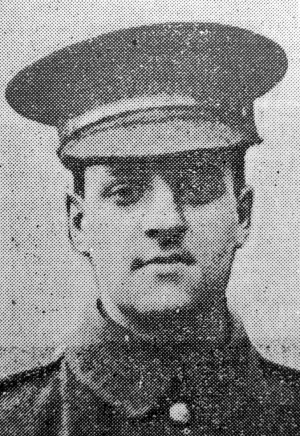
Claude Robinson, was the son of Samuel and Lucy Robinson, of 34, Wakefield Road, Flushdyke, Ossett. Claude, aged 6 in 1901, is living at Dewsbury Road, Ossett with his parents Samuel and Lucy (nee Taylor) who were married in 1895. Claude has a 15 year-old sister Alice and an 8 year-old brother Henry. Their father Samuel is a card cleaner in a mungo mill. In 1911, the family are living at Eldon Terrace Flushdyke where Claude is now working as a piecer on for wool department. His brother Harry is a piecer and bobbin carrier in a wool spinning room and sister Alice is a case maker pyrotechnist. Their father Samuel is now a street lamp lighter and Claude now has another sister, Kathleen aged 2 years.
Claude Robinson was killed in Salonica, Greece, on September 14th 1916. He was, at the time of his death, a Lance Corporal with the Lancashire Fusiliers. Unmarried, he worked since leaving school at Messrs Mitchell & Co’s mill in Dale Street for most of the time. He first enlisted with the 4th Hussars, embarked for France on the 13th October 1915 and was transferred some time later to the Lancashire Fusiliers. 11 months before he died he was sent to Salonica with a company of men, and regularly wrote home, his letters always being of a cheerful nature.
Claude’s parents received news of his death in a letter from his commanding officer, Lieutenant W. N. Settle. It appears that Claude was with a trench mortar battery, and had not been with his regiment for a few weeks. The brigade assaulted and took an enemy position on the night of 13th / 14th September, and Claude’s trench mortar battery was instructed to come up and assist with holding the trenches.
On the morning of the 14th September, Claude and Lieutenant Settle went up to fix the mortar positions. Settle left Claude in the early afternoon to take an important message back to headquarters. The enemy put up a fierce barrage in the rear of the captured trench all day, and Claude was hit and killed during this assault while making his way back to headquarters. Lieutenant Settle went on in the letter to say that Claude had acted bravely while passing through the heavy shell fire in the open, and he had died a brave soldier’s death. Claude had been a member of the United Methodist Free Church choir, and also a member of the church’s cricket club. He had been well known in the area.1
The 12th (Service) Battalion of the Lancashire Fusiliers was formed at Bury in September 1914 as part of K3 and came under orders of 65th Brigade, 22nd Division. They landed at Boulogne on the 5th September 1915, but moved with Division to Salonika, arriving on the 5th November 1915.
In October 1915, a combined Franco-British force of some two large brigades was landed at Salonika at the request of the Greek Prime Minister. The objective was to help the Serbs in their fight against Bulgarian aggression. However, the expedition arrived too late, the Serbs having been beaten before they landed. It was decided to keep the force in place for future operations, even against Greek opposition. The Greek Chief of the General Staff in Athens had told them “You will be driven into the sea, and you will not have time even to cry for mercy” (Some Greek factions, including King Constantine, were pro-German). The outcome of the Gallipoli campaign was in the balance and most shipping in the area was involved so they really had no choice.
During the first four months of 1916 the British Salonika Force had enough work to last it for the rest of its life. Large amounts of barbed wire was used and a bastion about eight miles north of the city was created connecting with the Vardar marshes to the west, and the lake defences of Langaza and Beshik to the east, and so to the Gulf of Orfano and the Aegean Sea. This area was known as the ‘Birdcage’ on account of the quantity of wire used. The Bulgarians and Austrians also fortified the heights of the hills surrounding Salonika during the same time, which had dire consequences later on. The Allied Salonika Force dug-in until the summer of 1916, by which time the international force had been reinforced and joined by Serbian, Russian and Italian units. The Bulgarian attempted invasion of Greece in July was repulsed near Lake Doiran.
Claude Robinson is buried in Karasouli Military Cemetery2 in Greece at grave reference D. 714. The cemetery is on the edge of the town of Polykastro(formerly Karasouli) which lies some 73 kilometres from Thessaloniki. The cemetery was begun in September 1916 for the use of casualty clearing stations on the Doiran front. At the Armistice, it contained about 500 burials but was greatly increased when graves were brought in from several other military cemeteries in Greece.
References:
1. “Ossett Observer” October 1916